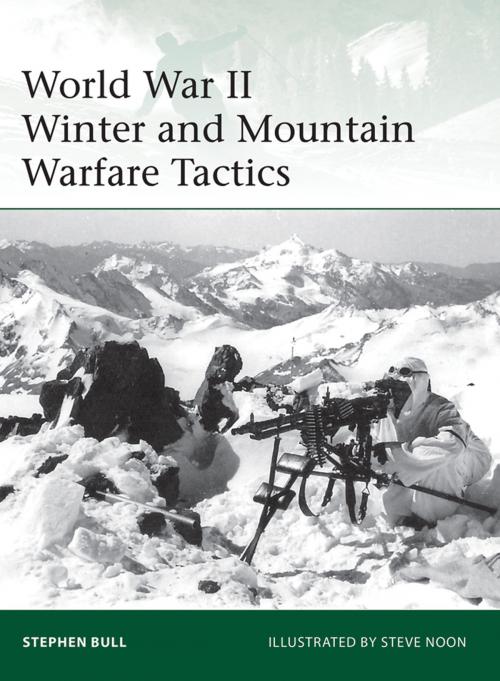World War II Winter and Mountain Warfare Tactics
Nonfiction, History, Military, United States, World War II| Author: | Dr Stephen Bull | ISBN: | 9781782009412 |
| Publisher: | Bloomsbury Publishing | Publication: | April 20, 2013 |
| Imprint: | Osprey Publishing | Language: | English |
| Author: | Dr Stephen Bull |
| ISBN: | 9781782009412 |
| Publisher: | Bloomsbury Publishing |
| Publication: | April 20, 2013 |
| Imprint: | Osprey Publishing |
| Language: | English |
The twentieth century saw an unprecedented emphasis on fighting in all terrains, seasons and weather conditions. Such conditions made even basic survival difficult as subzero temperatures caused weapons to jam, engines to seize up and soldiers to suffer frostbite, snow blindness and hypothermia. The conditions often favoured small groups of mobile, lightly armed soldiers, rather than the armoured forces or air power that dominated other combat environments. Some European armies developed small numbers of specialist alpine troops before and during World War I, but these proved to be insufficient as nearly all the major combatants of World War II found themselves fighting for extended periods in extremely hostile cold-weather and/or alpine environments. Drawing upon manuals, memoirs and unit histories and illustrated with period tactical diagrams and specially commissioned full-colour artwork, this study sheds new light on the winter-warfare tactics and techniques of the US, British, German, Soviet and Finnish armies of World War II.
The twentieth century saw an unprecedented emphasis on fighting in all terrains, seasons and weather conditions. Such conditions made even basic survival difficult as subzero temperatures caused weapons to jam, engines to seize up and soldiers to suffer frostbite, snow blindness and hypothermia. The conditions often favoured small groups of mobile, lightly armed soldiers, rather than the armoured forces or air power that dominated other combat environments. Some European armies developed small numbers of specialist alpine troops before and during World War I, but these proved to be insufficient as nearly all the major combatants of World War II found themselves fighting for extended periods in extremely hostile cold-weather and/or alpine environments. Drawing upon manuals, memoirs and unit histories and illustrated with period tactical diagrams and specially commissioned full-colour artwork, this study sheds new light on the winter-warfare tactics and techniques of the US, British, German, Soviet and Finnish armies of World War II.















